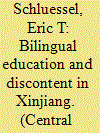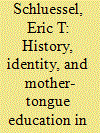|
|
|
Sort Order |
|
|
|
Items / Page
|
|
|
|
|
|
|
| Srl | Item |
| 1 |
ID:
080409


|
|
|
|
|
| Publication |
2007.
|
| Summary/Abstract |
Efforts to promote and impose Mandarin Chinese as the language of instruction in ethnic minority schools in the Xinjiang Uyghur Autonomous Region, aimed at further integrating the state and raising regional educational and economic quality, have had mixed success. The 2004 plan to consolidate Han Chinese and minority elementary and middle schools and to make Mandarin the universal language of instruction in those schools is fostering an immersive second-language environment without prior preparation for students, bringing native speakers of Mandarin into unfair competition with non-native speakers. The increased focus on Mandarin has already had grave consequences for ethnic relations, especially in urban Uyghur schools, where the project is focused, while the mandate for change in educational curriculum and methodology has also been poorly planned and remains under-resourced, negatively impacting educational quality. The Chinese government has available to it other language policy solutions that are both more workable and friendlier to minority sensibilities.
|
|
|
|
|
|
|
|
|
|
|
|
|
|
|
|
| 2 |
ID:
103141


|
|
|
|
|
| Publication |
2009.
|
| Summary/Abstract |
An ethnic identity is not simply a catalyst for collective action; rather, it is an idea, a social variable shaped by its own intellectual history and by the historical consciousness of those who, wittingly or otherwise, engage with and articulate it. As one example, modern Uyghur identity, as it is most widely understood today, is the product, in part, of the action of a series of educational institutions operating in the years before 1949. Intellectuals and activists, beginning in the 1880s, formed networks of schools that provided an organizational basis for social and political movements, as well as a site for the negotiation of the ideas of those movements. Uyghur identity, along with a broader scheme of ethno-national classification, gained currency among a particular sector of Xinjiang society through participation in a set of broader organizations in the Sheng Shicai era. This history is reflected today in the actions and attitudes of contemporary Uyghur intellectuals, who react to encroachment on mother-tongue education with ideas and organizations informed by historical knowledge of this earlier period.
|
|
|
|
|
|
|
|
|
|
|
|
|
|
|
|
|
|
|
|
|